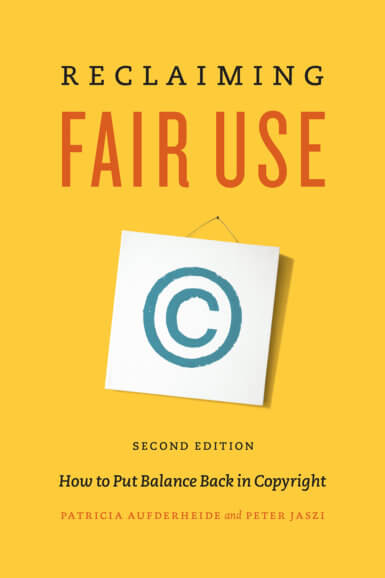True Stories of Fair Use: Sut Jhally & MEF
 Sut Jhally and the Media Education Foundation were profiled in Patricia Aufderheide and Peter Jaszi’s book, Reclaiming Fair Use: How to Put Balance Back in Copyright. The book challenges the widely held notion that copyright law is obsolete in an age of digital technologies. Beginning with a survey of the contemporary landscape of copyright law, Aufderheide and Jaszi draw on their years of experience advising documentary filmmakers, English teachers, performing arts scholars, and other creative professionals to lay out in detail how the principles of fair-use can be employed to avoid copyright violation. Taking stock of the vibrant remix culture that has only burgeoned since the book’s original publication, the new edition of the book addresses the expanded reach of fair use — tracking the Twitter hashtag #WTFU (where’s the fair use?), the maturing of the transformativeness measure in legal disputes, the ongoing fight against automatic detection software, and the progress and delays of digitization initiatives around the country.
Sut Jhally and the Media Education Foundation were profiled in Patricia Aufderheide and Peter Jaszi’s book, Reclaiming Fair Use: How to Put Balance Back in Copyright. The book challenges the widely held notion that copyright law is obsolete in an age of digital technologies. Beginning with a survey of the contemporary landscape of copyright law, Aufderheide and Jaszi draw on their years of experience advising documentary filmmakers, English teachers, performing arts scholars, and other creative professionals to lay out in detail how the principles of fair-use can be employed to avoid copyright violation. Taking stock of the vibrant remix culture that has only burgeoned since the book’s original publication, the new edition of the book addresses the expanded reach of fair use — tracking the Twitter hashtag #WTFU (where’s the fair use?), the maturing of the transformativeness measure in legal disputes, the ongoing fight against automatic detection software, and the progress and delays of digitization initiatives around the country.
You can read the excerpt below:
Media studies professor Sut Jhally runs the Media Education Foundation, and through it distributes videos that critique popular culture and current politics. His films all make extensive and confident use of fair use. He explained to us how it started:
In the late 1980s I developed some materials for a large lecture course I taught at the University of Massachusetts. At first it was just excerpts from music videos, showing stereotyping and misogynistic views of women. Over the course of several years, I gradually developed it into a stand-alone piece and by 1990, I thought it would be nice to share it with other educators. So I sent out a small mailing for the video Dreamworlds, and promptly got a cease-and-desist letter from MTV, both to me and the university.
I was quite convinced that I was covered by fair use, and said that to MTV; they never even got back to me. The university, though, thought I should just shut up. I said, Are you crazy? This was a great opportunity to make a statement about fair use and academic freedom. So that’s when they told me that if I did speak up, I wouldn’t be covered by university lawyers. I decided to go ahead with a press release, and launched the Media Education Foundation to distance myself from the university. We got great coverage for the event, as a free speech issue. MTV didn’t want to be near the story – it ran against their branding.
By now we’ve done 50 or 60 films; we use fair use the way it’s supposed to be used. It’s what the law allows. We also license stuff which we don’t think is fair use. When we saw the codes of best practices come out, we felt reinforced in our judgments.
In only one case has MEF received a challenge to its fair uses. When MEF distributed Price of Pleasure: Pornography, Sexuality & Relationships, two pornographic film distributors contacted MEF to complain that their work had been used without permission. In both cases, Jhally wrote back to inform them that their work had been used under the doctrine of fair use but that he would welcome a lawsuit. He believed, he wrote, that a lawsuit on freedom of expression issues, in which the pornography industry took an anti-free speech role, would be interesting indeed. Both backed off immediately.
“I used to believe that we would be the best test case for fair-use litigation, but we may be unsueable,” Jhally said wryly. He has discovered the reality that companies with competent lawyers don’t undertake futile lawsuits. “I guess the best thing we can do is to continue doing what we’re doing, using fair use fully and publicly.”
Full of no-nonsense advice and practical examples, Reclaiming Fair Use is essential reading for anyone interested in law, creativity, and the ever-broadening realm of new media. For more information about Aufderheide and Jaszi’s book, Reclaiming Fair Use: How to Put Balance Back in Copyright, please visit https://press.uchicago.edu/ucp/books/book/chicago/R/bo28242133.html.
And if you’re looking to learn more about copyright and fair use, take a look at MEF’s film, Freedom of Expression. This documentary translates the abstractions of copyright law into an engaging story about corporate power and the power of art. As Educational Media Review Online describes, “Citing legal cases and giving examples of people and companies which have been held liable for copyright infringement, Freedom of Expression is a must for anyone teaching a media study, library science or copyright law. The video should spur on classroom discussions and get students to think about what they see and experience everyday. Highly Recommended.”
We’re sharing the trailer to Freedom of Expression below:

